GLOBAL EXPANSION & CULTURES - UNIVERSITY LECTURE | E016 PODCAST
LISTEN TO THIS EPISODE ON ALL STREAMING SERVICES
INTERNAL EPISODE FROM ATHENS, GREECE
George Stroumboulis was asked to speak to the Business School students at the Hellenic American University in Athens, Greece with Director of Business Programs, Pete Tsolis.
George Stroumboulis was asked to speak to the Business School students at the Hellenic American University in Athens, Greece with the Director of Business Programs, Pete Tsolis. Speaking about his experience as the co-founder and CEO of Ideoli Group, George Stroumboulis was excited to join this class and the staff to talk about his experiences from starting the company with his business partner, all the challenges that they faced, the successes they have achieved, and what that meant doing it on an international basis.
This workshop is an initiative under a new B-Cube initiative of Hellenic American University on the skills and competencies needed to lead in different cultures.
Hellenic American University was established as a non-profit, United States institution of higher education through an Act of the General Court of the State of New Hampshire. Hellenic American University is accredited by the New England Commission of Higher Education (NECHE) and operates two instructional locations: one in Nashua, New Hampshire and the other in Athens, Greece.
B-CUBE HOW-TO SERIES: https://b-cube.gr/
AMERICAN HELLENIC UNIVERSITY: https://www.haec.gr/en
LINKEDIN: https://www.linkedin.com/company/hellenic-american-college/
INSTAGRAM: https://www.instagram.com/haecgr/
IDEOLI: https://www.ideoli.com
“It’s great and you get to travel and all that, but there are more negatives than there are positives. Before I came in here, my daughters were calling, crying. When are you coming home, I miss you. And I’m only here for two days.”
MEDIA RELATED TO THE EPISODE
George Stroumboulis was asked to speak to the Business School students at the Hellenic American University in Athens, Greece with Director of Business Programs, Pete Tsolis.
George Stroumboulis, Thenia Batanidou and Pete Tsolis introducing the workshop to the business class at the American Hellenic University located at 22 Massalias Street in Athens, Greece.
George Stroumboulis was asked to speak to the Business School students at the Hellenic American University in Athens, Greece with Director of Business Programs, Pete Tsolis.
George Stroumboulis was asked to speak to the Business School students at the Hellenic American University in Athens, Greece with Director of Business Programs, Pete Tsolis.
George Stroumboulis was asked to speak to the Business School students at the Hellenic American University in Athens, Greece with Director of Business Programs, Pete Tsolis.
ABOUT THE “INVIGORATE YOUR BUSINESS” PODCAST
The Invigorate Your Business with George Stroumboulis podcast features casual conversations and personal interviews with business leaders in their respective fields of expertise. Crossing several industry types and personal backgrounds, George sits down with inspiring people to discuss their business, how they got into that business, their path to the top of their game and the trials and tribulations experienced along the way. We want you to get inspired, motivated, and then apply any advice to your personal and professional lives. If there is at least one piece of advice that resonates with you after listening, then this podcast is a success. New episodes weekly. Stream our show on Spotify, YouTube, Apple, Amazon and all other platforms.
ABOUT GEORGE STROUMBOULIS
George Stroumboulis is an entrepreneur to the core, having launched several ventures across multiple industries and international markets. He has held senior-level positions at progressive companies and government institutions, both domestically and internationally, building an extensive portfolio of business know-how over the years and driving profit-generating results. George’s ability to drive real change has landed him in several media outlets, including the front page of the Wall Street Journal. George was born in Toronto, Canada to his Greek immigrant parents. Family first. Flying over 300,000 miles a year around the world puts into perspective how important family is to George’s mental and emotional development. With all this travel to global destinations, the longest he stays even in the most far-out destination is 3 days or less - a personal rule he lives by to make sure he is present and involved in family life with his wife and three daughters. To read about George’s global travels, stay connected with his blog section.
STAY CONNECTED WITH GEORGE STROUMBOULIS
STREAM & LISTEN TO THE PODCAST:
SPOTIFY: https://open.spotify.com/show/1rW2CmxQoiJNEPOZupJlvd
YOUTUBE: https://www.youtube.com/user/Stroumboulis
APPLE iTUNES: https://podcasts.apple.com/us/podcast/invigorate-your-business-with-george-stroumboulis/id1607693240
AMAZON MUSIC: https://music.amazon.com/podcasts/8fc03929-71b3-483a-a64e-153e30b3d462/invigorate-your-business-with-george-stroumboulis
iHEARTRADIO: https://www.iheart.com/podcast/269-invigorate-your-business-w-92187370/
STROUMBOULIS SITE: https://www.stroumboulis.com/podcast
PODCAST SITE: http://www.invigorateyourbusiness.com
OTHER SERVICES: GOOGLE, PANDORA, OVERCAST, CASTRO, CASTBOX, PODFRIEND, PLAYER.FM, PODCASTADDICT, PODCHASER, PODCASTINDEX and RSS FEED.
FOLLOW GEORGE STROUMBOULIS:
INSTAGRAM: https://www.instagram.com/georgestroumboulis/
YOUTUBE: https://www.youtube.com/user/Stroumboulis
LINKEDIN: https://www.linkedin.com/in/Stroumboulis/
TWITTER: https://twitter.com/Stroumboulis
FACEBOOK: https://www.facebook.com/georgestroumboulis
TIKTOK: https://www.tiktok.com/@georgestroumboulis
CONTACT GEORGE DIRECTLY: https://www.stroumboulis.com/connect
FULL SHOW TRANSCRIPT
George Stroumboulis: My first internship was in Greece when I was 19 in Kerkyra (Corfu), Cool Avenue. I thought I wanted to live in Greece when I was 19. And then I lived here for a year and realized I don't want to live in Greece.
My name is George Stroumboulis and I'm extremely passionate about traveling the world, meeting new people, and learning about new businesses. Join me as I sit down with other entrepreneurs to learn about their journeys. This episode of Invigorate Your Business starts now.
In today's episode, I get to speak to the business class at the Hellenic American University, on my experience as the co-founder and CEO of Ideoli group. Really excited to join this class and the staff here in Athens, Greece, and talk about my experiences from starting the company with my business partner, all the challenges that we had, the successes, and what that meant doing it on an international basis. So, really appreciative. Thank you to Panagiote Tsolis for making this happen, his incredible staff at the University, and his incredible students that were engaged, providing feedback and comments and their case examples and really making it a dynamic conversation a really fun time. Hope you enjoy this episode, and please subscribe, comment, and let us know your feedback.
Thenia Batanidou: So welcome to Hellenic American College. Okay. I'm sure that most of you know us here. Okay. I'm glad to see you all, and thank you for being here. Thank you all for joining us through Zoom. I hope that you're able to hear us and see us as well. If you have any issues, just use the chat. So today's workshop is an initiative under a new B-Cube initiative of Hellenic American University. And it's a workshop on how to lead. Okay. And it's specifically on how to lead skills and competencies of leading in different cultures. Today's workshop will be co-led by Mr. Pete Tsolis, our Director of the Business Programs, and Mr. George Stroumboulis, the CEO of Ideoli Group. We have to highlight here that nothing would be possible without the amazing support of Ideoli Group. And we thank you so much for everything you've done so far for us.
George Stroumboulis: Thank you.
Thenia Batanidou: Ideoli group is a custom interiors firm that specializes in lighting fixtures, furnished elements, and showcase products.
George Stroumboulis: Nailed it.
Thenia Batanidou: Yeah, I think, and I've actually browsed through your website and have to tell you that I'm impressed. I've seen your project. I've seen the Rockstar team.
George Stroumboulis: Awesome.
Thenia Batanidou: And I really like this word, like the Rockstar team, because I'm sure that you are a rockstar team. And I would encourage everybody here to take a look at the website of Ideoli Group and see all the amazing projects that you have completed. And once again, thank you for being here. And I hope that you'll enjoy the workshop and I think that I must give the floor to you and to you. And thanks so much.
George Stroumboulis: Thank you.
Panagiote Tsolis: Well, thank you.
George Stroumboulis: Appreciate it. Thank you.
Panagiote Tsolis: Everyone online. So, this is an interactive conversation. It's not just the two of us having a conversation. The way the flow will happen is, first we're going to start off with a little bit of theory on global leadership. What are the competencies? How do teams work in multiple environments, either globally within a country or globally around the world? Ideoli only has offices in the US and in Greece. Correct?
George Stroumboulis: And in Argentina and in China and Vietnam.
Panagiote Tsolis: So, the complexity of what their organization does, and my background is in global leadership, we're going to have this conversation. Please raise your hands if you're online. Please raise your hands if you're in the classroom. This is a conversation because as I look out, I know actually quite a few of you online and in person, you two have global backgrounds. There really is no one way of leading. There are different styles. The style that I like to gravitate towards is situational. In situational leadership, you assess the situation and you provide the process that you'd like to do based off that situation. All right?
George Stroumboulis: Absolutely.
Panagiote Tsolis: There we go. Okay. First one, team competencies. In organizations, we have teams. Those teams could be small, as in you and a coworker, they could be larger. So in the team competencies, we're trying to ensure the team and individuals have the right skills for their roles and within the organization. So, George, give us a little bit of history on how you are able to go from multiple locations and how did that dynamic change? Because we're not only talking about North American and European, we're also talking about Latin American. So there are multiple different cultures, multiple different cultural norms. How are you able to bring these all together?
George Stroumboulis: Yeah, absolutely. So first take it in a personal environment, right? How many of us have friends who are a different culture than you? Right? Everybody in the room friends, relationships, girlfriends, boyfriends, whatever. It's no different. You know certain nuances that affect people good, bad, and how to interact with them. Apply that in the business world, it's kind of the same approach, right? You know certain cultures, preconceived notions that you have about them and you try to adapt. So we, my business partner was supposed to be here tonight. He's from New York. He's an American. When we started this company, we were at a previous startup before this, right? So we had experience internationally working in Asia and manufacturing our products. So when we started this company, we knew immediately we had to be international to succeed. Right? So from that point forward, our first partner was overseas in Asia. So going through that dynamic and then as we started going and then into Greece, right. We have the Ideoli Greece team here tonight as well. They opened up our eyes on wow, you know very strong talent here. We can make this work, right? So anywhere we've gone, it's always started with, can you build someone with trust? Because you always need that anchor, whatever country you're going in, right? Perfect example. Kostas Varnavopoulos is our managing director here in Athens and we have a relationship now, 15 years, totally unrelated to lighting. I know Kosta from back in the TV production days, and the first thing we connected on was trust. He wasn't asshole, I wasn't an assholes, right? For putting it, you want to work with good people, right? And then the rest will come. And we built that friendship. We did some side stuff together. And then when the opportunity came for Greece, right? It was like, he's the guy, he's my guy. It makes sense. And we built an office around him. Georgios Mavridis has been with us before we even opened an office in Greece, because we connected on a personal level, really hard workers. You know, the Greeks think differently. Good, right? So we started looking at markets like that. Some negatives. Time zones, right? So when New York is awake, Greece is seven hours ahead. Okay, we need to have access in real time. Let's start looking USA, great, let's start looking South. Argentina makes sense. They have a very creative, great workforce down there, right? When it comes to design of products, engineering and so on. So we opened up in Buenos Aires, Argentina. Now they're on the same time zone as us. So, we've developed a team that has always been anchored by someone who becomes the anchor in that market, right? And then we can build around them. Because without that anchor, you can't go international.
Panagiote Tsolis: Yeah. One of the, you know, as we're talking and going into the theory of how to build global teams, I come to think about Jim Collins and the book Good To Great. Has anyone ever read that book? So in the book, Good to Great, Jim Collins actually just analyzes countless companies. And he comes up with the analogy of the bus and what is the bus? You as the leader help identify where people are on the bus. You're going to be the driver, you're going to sit at the window, you're in the back, you're in the front. Why do I need you there? And when it comes to that for our leadership, it's our job as a leader to identify where there are gaps within the bus. What seat needs to be filled? Is that seat filled now? Is it filled later? What are our roles? In essence, we have to look as a team. And that's where we're talking about when it comes to team, building team composition, all these things. And so, George, did you ever have any conflicts or any issues when I came with building this team dynamic through those multiple offices?
George Stroumboulis: Countless. Like, there's always conflicts, right? And it's how you address it. And I believe the next slide is the team communication, which ties in perfectly to this. Again, back to relationships, friendships, types of tourists that you see coming to Greece. There's always, man, this type of people, they act a certain way. And you always go into this thinking a certain way. Like this group, this culture acts a certain way, right? When you run a business and you're trying to deal with different situations and cultures and backgrounds, you got to strip that away. You got to pull back politically what you think. Because what I think in America is different than what you think here in Greece. And this person in China and this person, we all have different backgrounds, right? So, you just got to strip it down before you build it up again and just understand, hey someone in New York today was talking to someone in Greece and the Greek person had an attitude today. Well you know what? We all have a problem. Well, what's going on in Greece? It's shitty weather. A train crash yesterday, right? There's a strike. It took them two hours to get somewhere. You always have to keep that in mind. It's easier when you're a smaller company, but the bigger you get, it gets harder to have that personal connection. And we're at a point right now where like we care about what's going on in everyone's life because we're able to keep that moving along.
Panagiote Tsolis: And just to go into your background a little bit, you know, even though your company's in the US, you're Canadian. Greek Canadian, correct?
George Stroumboulis: Greek Canadian, yeah. Greek Canadian. My first internship was in Greece when I was 19 in Kerkyra (Corfu) Cool avenue. I thought I wanted to live in Greece when I was 19. And then I lived here for a year and realized I don't want to live in Greece, right? Just because and I don't mean that. Like, when you come here on vacation, it's amazing and you know, the frappe and the ‘this’ and the ‘that.’ And then when you come here its like, wait, you got to go get your license and you have to pay 18 different people. Like it's a different system, right? Obviously it's come a long way in 25 years. So that really opened up my eyes. And then having the right partners in the local market. Like, I would never be operating in Greece right now if we didn't have strong partners here. Like, there's no way. And then even when we opened our office here, certain people that we had here just wasn't a fit. And if that was our first entry into Greece, seeing that we would've exited right away. But we knew, hey, we had strong partners. So we just have to keep building around that.
Panagiote Tsolis: Yeah. And it's an emerging market. I have a couple questions in the room, Dr. Yiannakis.
Student 2: It's not a question really. It's an issue, right. So you're mentioning cross-culture, cross-cultural team composition, right? Do you have some sort of a, because this is what the B Cube How-To is approached? Do you have a cross-cultural role framework that would sort of equip the team with the right skills? Because you mentioned they're the right skills, but you what are the right skills. In a cross-cultural environment, do you have something like that?
George Stroumboulis: Yeah. Great question. So, actual framework, right now, we always go with our gut. So we're a lighting company and we have certain roles that you have to have the technical know-how to qualify for that position, right? So every company always has overlapping customer service, project management, freight finance, any company, even the Souvlaki stand downstairs has customer service and all that, right? But then we're a lighting company. We need engineers, we need technicians, we need architects. So we need all that. So when we look at different markets, we don't have an actual framework. It's always do they qualify whether they're in the US or in Vietnam for the skills. And then it's got to be that human aspect. Like the majority of times we walk away from interviews saying, it just didn't feel right. It didn't feel right for our people. Right? Of course, as interviewing someone, my first question is, how did it feel? Well, it felt this, and this. Well, what was your mindset? Well, you know, actually this, and this. Okay, so you didn't have the best mindset going in. Maybe. So let's look at, so we always go with does it feel right? Is this person going to bring energy to the office or at a minimum, don't take away from the energy we're creating because that's a big deal, right? And coming in with an American-Canadian mentality, culturally it's different than dealing in Greece for example, or in Argentina. It's a different system here, right? It's just a different system. And I'm not saying worse or better, it's just different. So we always go with our gut and then the rest is your basic skill level for that position.
Panagiote Tsolis: Yeah. When it comes to leadership theory for global leadership, there isn't necessarily a framework per se, but there are competencies. And through our next slide, we're going to go over the different competencies and what those mean. Hello. Do we have any other questions on this topic? Any experiences that you've might have had working in a global environment and identifying gaps within team competencies. Language barriers, for example.
George Stroumboulis: I have a question. In general here, are there any international students that you study with throughout your studies.
Student 3: Yes, we do.
George Stroumboulis: Okay. So for example, you're a Greek culture. What's an example? You know, there's a culture. What are some barriers you had even from team meetings or assignments or communication? I'm just curious because I bet you whatever you say, you extrapolate it. It's the same when it comes to this level. How do you handle it? What's going on in their own mind? Right? So I'm curious, like when you deal with certain cultures, have you seen any differences?
Student 3: I would say eventually, no. I happen to do my master's degree in London and I have been contacted and cooperating with culture around the globe. When it comes to you know, to deliver certain assignment, it all ends up to a common target. So, there were no barriers, right? But the workouts are differences. But again, we're young people sharing same goals, same dreams. So at then I would say no, finding barriers.
George Stroumboulis: Excellent.
Student 3: Understand the different council. But at the end, when you are an open minded as a second goal, then there's no difference.
George Stroumboulis: And that's just a great point right there. If the core doesn't have a strategy on what we're trying to do as a company, right, and that's not being translated to the market, then it's just people working in offices. And there's no common goal strategy. It has to come from the core.
Panagiote Tsolis: Well, in essence, a lot of where there could be any conflict when it comes to the team would be the power dissonance. So in western societies, we're able to go to our bosses and say, I disagree, I don't like this. This might be changed. I have a suggestion. In eastern cultures, they don't do that. In China, I had a friend that worked. He opened the Wynn Macau, which was, you know, multi-billion dollar hotel casino. And he would actually go to his employees. He was Hispanic American. And study in the US. Please give me advice. What do you think? What are we doing wrong with our analysis or reporting? Yes, yes. That would be the answer. Why? Because those are other cultural norms. And so identifying that as you're going into a new market and learning these cultural differences, then you can start moving pieces together and start training people. Because like George said, it's not one way is better or another. In Asian cultures, they have plans for a hundred years out. In Western cultures, we look for the quarter. We look to see what our returns are now what about our bonuses this quarter? So these are differences and not one is better than the other because you have to play ball within the environment that you're in.
Student 1: The topic that you discussed, I have to say if you compare. In 2005, I was working in very international company, oriented, clear vision, perfect goals, multinational. We were almost from one around the globe in the south crown where, which was nice. At the point we start to cooperate with the company in India. In 2005, working with people of India, it was really hard. Why? Because for us, whatever we will ask, they would say yes. Because they're extremely polite. But at the end of the day, we had another impression of what the deliverable was. And of course, it was a very big gap in what we asked and what they delivered. Going through these years during working with the international people and working off with students from different countries, I have to say the culture changed. And it is the impact of the social media. It's also the open culture of e-heading, so we have to say that there was a big gap on the cultures. When there is no clear vision, it is a problem. But let's say even when the clear vision was at that time to take better for, you know, because we're more global, I think due to the social media. So I have to say this one.
Panagiote Tsolis: No, thank you. And that's what we're looking for. And if you think about it, you know, I don't know where the eight participants online are, right? We have six participants that are joining us online. We're influenced by television, we're influenced by music, we're influenced by culture. So we're actually moving much more closer to similar cultures in that respect. Let's go on to the next slide. Online, do we have anybody that would like to join in on conversation? So to your point earlier, communication, how do we communicate across cultures, across countries and via technology? Coming from the US, there's even cultural differences between New York, Los Angeles, Texas and so forth. So even within a country, you could have diverse populations. In the US, we have Caucasian Americans, African Americans, Asian-American, Hispanic Americans. There's different backgrounds to everyone in that melting pot of a country. Different historical components to it as well. So when you're working even within a small pot of one country, you can find differences culturally, gender differences. I see that we have four women that are sitting together. Usually when you go into a room, you sit with people that are similar as you. If you were to take 30 random people and put them into a room, most likely, depending on skin tone, depending on gender, depending on different types of backgrounds, people will gravitate to each other. This is research that's done in the US. Obviously, in Greece, there's a little bit of differences between the dynamic of the population, but in the US, that's what they see. To where if you have people from the same background, they gravitate. Why? It's comforting. It's comforting to sit next to somebody that looks like you. That's not a bad thing or a good thing. It's just our biases that we already have. Understanding what your biases are and moving past that. That's how we move forward as leaders. And to identify what happens when you're in a conversation, like the stereotype. An assertive woman isn't assertive, she's a bad word. That's one of the research that's happens in the US is where they say, if a woman is assertive, she's a B word. No, those are biases. Those are internal biases. And how do we look past that? So going into these topics. George, within the dynamic of your organization, can you give us a couple examples of, you know communication gaps when it came to a cross cultures across every country and even in this technology?
George Stroumboulis: Yeah, absolutely. So one thing I'm really good at is pointing out what we're really bad at, right? And one thing I'm really good at as well is knowing what I'm not good at. So we can hire, right? You always got to know where your weaknesses are. The one thing we're really good at as a company, and COVID was a real eye-opener was our team communication, right? So, we've set it up on purpose to have 24 hour, six days a week coverage. So when California's going to sleep, China's waking up, when China's going to sleep, Greece is awake and so on. And that helps keep our projects going because we sell and install our products in over 30 countries around the world. So it's important to have that. COVID happens, the world shuts down. So, it's all this stuff. Okay? So that happens and we realize our communication before COVID started was incredible because we use certain softwares to communicate with our team. So everything's transparent and we keep the projects going. So the Chinese, the Greeks, the Americans, the Canadians, the Argentinians, the Vietnamese, we're all communicating fine. So we were already connected. Now, hey, why did so-and-so in this market just say one word answer to me? Why did this, that, this was a big issue culturally, right? Certain cultures like to say, Hey, how are you? Good, yes. We need 24 hours to deliver it. Other cultures just say 24 hours period. Send. And it's perceived differently. Again, depending on what's your mood of the day? Did you have your coffee yet? Well, it's late here in Greece, I just want to get out of here because I got a date with someone and they're just waking up and they have energy. So, we've always addressed that. And the one thing we do really well and the team could talk to this is let's get on the phone. Hey, this person wasn't trying to say that you're incompetent or whatever. Like, let's talk about that in real time because we've also failed and things brew over time and people just say, I can't work in this and I want to leave. And so we've learned early on, hey, if this is an issue, let's address it. Let's get on a call. Even organizing calls is difficult. Like you have to play math time zones every day to see like, okay, what's the optimal time for these five, six markets to get on a call and do that? Because that's how flat our organization is and everyone's so vital to the process. So, we've learned to just address in real time. And actually I would like to throw it out to like Yorgos Acosta, you know, what are some things that we do to help the team communicate better?
Student 4: I think due to the fact that we operate in this way, we're always open to discuss or to get on a Skype call or to give like a small summary of what we did and also be open to the critique or what our weaknesses are so that we can achieve a better communication and keep up with all the projects that happen.
George Stroumboulis: Absolutely. Well and another thing is so Yorgos has been with the company, one of our longest employees that we've had before we even had our office here. And he originally started, he was working US hours. So he would start his day at two in the afternoon. Right. And work New York time. And at the beginning it's like great, right? You always go into a new job and you're like, I'm going to do this. I can do it. Well, we all have a life, right? There's life, there's spouses, there's dogs, and time goes by and he's an amazing designer. Like if you see the products we do and what he's able to do, it's phenomenal, right? And it's a super talent, but you also got to speak up for yourself. Because a lot of times you're like, hey, I like this position, I like the company, I like the people. These hours are starting to bother me, but I can't really do it anymore. But I don't want to say anything because I don't want to piss off George or Chris or get them angry. And you got to be your own advocate because finally it's like, Hey guys, can we scale it back two hours and this? And finally we're like, no, we got to open up an office and the Greek's got to work on Greek hours and so on. So you got to be an advocate for yourself, not because we're trying to take advantage of everyone, but when you're busy, you just go through the motions and you forget about, oh, he's on US time zone and he's working till midnight every day. That's not great.
Panagiote Tsolis: One of the things you touched upon was cultural norms. So in Greece, is Greece more of a relationship culture or get down to business culture?
George Stroumboulis: Relationships, yeah.
Panagiote Tsolis: We don't start a conversation or a meeting going right to work. In the US, how is it?
George Stroumboulis: Oh, well even from, I lived in New York for 12 years and then moved to California. Even within the States, it's, let's go to the point. You go to California, it's a little more lacked but yeah, it's to the point.
Panagiote Tsolis: So understanding the culture and the environment that you're working into George's point, this is something that I actually had to shift coming in and teaching and working here from the US. You know, I came in as an American like boom. And then I had to realize, whoa, check your own biases, man. Learn who these people are, create these relationships. This isn't a working in environment to where it's just transactional. You build off of it.
Student 1: Yeah. Well, I mean speaking, you know, about communication, I have to just share something with you today here. Something that I keep reminding, first of all. So before we get offended, the thing that we should step back a little bit and think of the culture of –
Panagiote Tsolis: Check your biases.
Student 1: Yeah, exactly. Because for example, I have to give you some examples of me. When I started working with internationals, I mean, I was at first offended and I felt really bad when they kept on mentioning for example, do that ASAP or send me that ASAP, I was like, Hey, where is your, let's say kindness. Where is your politeness? Where here in Greece, we would be like, I was wondering whether you had the time to review that. And then when you never see like a message from somebody that you don't know, you've never talked with and it's like, hey, I want this ASAP, as soon as possible in the urgency. I was really offended. And I felt insulted at some point. Then I started realizing that it's a cultural issue coming from places where bureaucracy and delays are evidence. So I mean, I should learn how to respect their need to ask me to be quick in the responses. Because in their country, whatever the country is, there are delays. So this was something that, you know, I think that needed and required my inner process to be developed. I mean, I should work on myself. I mean they couldn't change their culture, but I could change my behavior and how I felt towards them. And anyway, I have come to realize that kindness, investigation.
Panagiote Tsolis: Gender roles.
Student 1: Yeah. And yeah, I mean kindness. What is kindness? I mean, kindness is not the same for everybody. Time notion is not the same for everybody. For example, have received messages like, hey, how was your night? And I'm like –
Panagiote Tsolis: Why do you care?
Student 1: I respond like, how was my, yeah. But for them that was normal, so that's okay. Or I'll share it with you. Like stay hydrated. I was like –
Panagiote Tsolis: Somebody told you, stay hydrated.
Student 1: Yes.
George Stroumboulis: Do I look like a raisin? Why are you telling me that? Right? Like, what?
Student 1: I was like, really? At first I was like offended. But then after, you know, some investigation, I realized it was okay for them. And it was just a typical expression.
George Stroumboulis: So let me ask you though. You said something very key. You yourself said, I need to change, but most people don't do that or unless they're got – Okay. So what was the alternative if you didn't do that, you would quit or?
Student 1: Probably. You know, just answer in a way that would be rather offensive on my hand. But pointless.
George Stroumboulis: Yeah. And creates an environment that nobody –
Student 1: Pointless.
George Stroumboulis: Yeah.
Panagiote Tsolis: It's great insight.
Student 1: Yeah. Understanding, right.
Panagiote Tsolis: Well, there are a couple components. There's emotional intelligence. Can you understand the other person? Can you understand your own emotions? Can you handle the situation and be present. Mindfulness as well? You know, I teach leadership courses in the MBA class and my first class is self-leadership. Identifying who you are. You can't lead others until you can lead yourself. To the point earlier, what do I do to change? I talk about this with colleagues all the time. There's two things you can do. The degree of influence and the degree of control. I cannot control any of you. Even if I have your grade on the line, all I can do is influence you. At the end of the day, you have to motivate yourself. You have to be the driving force and understanding where your role is within the organization. So going back to the conversation about the bus, what's your role on the bus? What did Google do after a couple years of being in business? The founders actually hired a CEO. They said they needed a prep, they needed a boss, they needed a grownup because they had just wanted to develop software. Dr. Yiannaki.
Student 2: Right. Just question a little bit back, right? Just I've got a few minutes back. You have developed an organization around the number of countries. Why so diverse? And when?
George Stroumboulis: And when? Great. So day one, we needed Asia. We manufacture in Asia. We had to be in Asia. So we were there. So our background, we had a previous startup, my partner and I, and we were working in Asia seven years, setting up factories, setting up production lines, making LED products. So we were already there, but that also opened our eyes as well. Like, we need to find the right person, invest in a factory and open up. So Asia was day one when we were even thinking about what to name the company. We knew that was the piece. US Base. USA is a huge market, right? Great company, successful. Why go out outside? We didn't choose to do that from day one. We grew up international, right? Greek, Canadian, love Greece. I studied in France, lived in Ireland. Like the international is great, but our clients took us international. So our first client was a restaurant chain called California Pizza Kitchen out of California. And when we sold our previous company, we couldn't look at lighting without being sued from our previous company. So we're like, okay, what are we going to do to pay the bills? We both got new mortgages. We both had a new baby at the time. We had to pay bills. So we're like, we're going to get into the furnishing side of it, right? Well, we're lighting guys, what do we know about furniture? Well, if you could do lighting, you could do furniture was our mindset. And we just jumped into it. So our first job that we got, we started winning contracts in the Middle East, Abu Dhabi, Bahrain, Saudi Arabia, with our products. So right away, we started working in those markets and then that kind of evolved on, hey, it would really be nice if we had someone localized in this market, right? And then we started working with brands that wanted to go to the USA. So now, this past week I was in Amsterdam and Norway meeting with clients who want to expand into the US. Well, guess what? Now we have an office here in Athens. They can start doing those calls. They could start doing those packages. So we had a vision on what we wanted to do, but our clients made us international overnight. And then we landed a really big client that literally overnight, once we developed this product, they took us to 30 countries around the world within six months, right? So overnight we became international because we wanted to. And it's exciting. Like, it's exciting being able to go somewhere. And again, we're talking international and I should say that, yeah, it's great and you get to travel and all that, and it is, but there's more negatives than there are positives. And you got to, like, before I came in here, my daughters were calling crying. When you coming home, I miss you. And I'm only here for two days. Like, I could fly to China and back and stay there for one day because you want to be with your kids, right? It takes a toll on your body. The sleep, finances, like, we haven't even talked about international currencies, right? Like we're buying in R&B in China. Well, guess what? The markets are not doing great. We're getting affected. We're selling into Canada. There's so much market exposure that we've lost hundreds of thousands of dollars over the last few years just on fluctuations. So there's so much exposure that the safe bet, like if my kids were starting a business, focus in one market, right? From a sales standpoint. But chances are, even if in you're in this market, you have to buy products from the outside. So even the local stand is an international business, right? But you just got to ask yourself, what do I want for my family as well? It's tough.
Student 2: Yeah. Thank you.
George Stroumboulis: Thanks.
Panagiote Tsolis: So it sounds like, you know, going back to the previous slide when it came to the team, members of your team are actually outside of the organization as well. In some respect, you know, how many of us do work where our vendors, our team members, our suppliers are team members. So the dynamic and the stakeholder component of what an organization is also very vital. You know, in one of my lectures, I like to talk about systems thinking. Organizations are systems. It's not marketing as a silo, it's not finance as a silo. It's not executive management as a silo. Let's say sales goes out and sales more products. What can manufacturing make more? Can I get people on the line in China to go do it? Well, I've already got money coming in. Or what about my accounts payable can finance actually fund the new products? Got to move money around. So by even looking within the organization, identifying what your role is and everyone else's role, not to say I can do your job or you could do my job, but have a level of understanding ,that communication aspect to where everyone's on the same page, they have a vision and they're moving forward.
George Stroumboulis: Absolutely.
Panagiote Tsolis: Online, do we have any questions? I'd love to even have a little bit of your input. Please type in the chat box if anything. If not, we'll just keep going. And so, George talked about conflict, financial issues. Where do you move money around? Cultural issues. You say certain things that could be offensive to another culture. So second book recommendation. The first one was ‘Good to Great.’ Second book is ‘Kiss, Bow or Shake Hands.’ Has anyone ever heard that book? So it's about this big and it goes through every single country and it talks about their cultural norms when it comes to doing business. So I worked in casino gaming for 20 years, and my job was actually to bring in players to gamble. One of my biggest players, his average bet every hand was 150,000. Speedy. It's insane. I'm like, I'm making 40,000 a year. And I'm like, I have loans. Can I have some of this? One thing to realize though is as the customer was gambling, I shouldn't touch him on the back of his hand back, as gambling, to go up and say, are you okay? Why? I'm taking away his luck. So going to my experience in the casino world, American gamblers are different than Asian gamblers. If you go to Macau, it's very sterile. 40 billion in revenue comes through that Wine Island or chain of islands when it comes to gambling. Las Vegas's 9 billion in revenue. Las Vegas's party, people dancing on tables, people going crazy. And China, it's quiet. If you go to different parts of the US with tribal gaming, it's a little bit of a hybrid. There's also no inventory. So people are gambling together. Let's say we're both at a casino and the table's full. I will put my bet on top of your bet. And so you're betting for me and everybody else behind, these are all different cultural norms that we're having even in one industry that's very unique. So going back to conflict resolution, how do we find a peaceful solution to a disagreement among them when there is a cultural gap?
George Stroumboulis: I have a comment on this one. So I'm going to take it from the other approach, the positive side, right? The one thing we do, it's just because we said it doesn't mean it’s right? That we set up our company and there's a few principles that we never want to shy away from. We always respond to the client immediately. Everything we do is because we exist because of the client. So when they need something within reason, we have to do that. And in the beginning, people coming on board, they're like, all right, I'll do it tomorrow. Like, my day's almost done. It's like, no. Like, that's one thing we can't sacrifice. Because even though we're a growing bigger organization now, it's still a few people that are our clients, right? So those are the calls I need to take. We need to deliver that. But there's so many scenarios that, you know, a certain office or person will say, well, why aren't we doing it this way? Right? And we're not like, no, this is the way we do it. We're Americans. It's like, all right, why do you see it that way? And when we have that, so many good things come out of that from processes from the systems we put in place. And just being able to do that. And then back to, I never caught your name. Sorry. Damien, your question before on why we go international, well, guess what? The Americans have a difference. Diverse, yeah. But you get, when it comes to designing product, you know, the Latin Americans and the Greeks have that European flare that's different than your typical American who's designing or Canadian. So we win in the end, right? Like all that passion and chaos and all that stuff, like our clients win in the end.
Panagiote Tsolis: Is there perceived value with something that looks a little bit more European in the US market?
George Stroumboulis: A hundred percent. Like not our products in general? Yes. It's always, and even if you take Italian brands German brands, they're two, three times more than standard lighting companies in the US, like from our standpoint. So we don't market it as that. You know, and again, our Athens offices, our European office, we don't market it as Athens, Greece, it's European. And then they're like, well, why are you in Athens? It's like, well, why not? Right? The talent pool's amazing. Everyone's educated. You could be anywhere in three hours. Middle East, gateway to the Middle East, and we have projects, you know, and Betty, who's on our team. 20 years in the industry, lighting designer, has done major projects in this country. And we're fortunate enough to interview or hire, and she's just kicking butt. And for us, internationally, not in Greece, right, it's what we're doing overseas where American clients are seeing these lighting studies and they're like, this is really great and thorough. It's like, well, yeah, obviously. Good job, Betty. Right? It's like, so it's great seeing that, right? And that makes us more excited and eager to want to invest more in this market and get talent like that. And for everyone, Betty or George or Kosta or Louisa, there's a couple that just don't fit for us and for them. So it's just a constant struggle.
Panagiote Tsolis: One thing to also look at when it comes to conflict resolution is what is your internal culture? We talked about cross culture. Your internal culture is almost as pivotal as the business that you're in. Do we have disagreements within different divisions? Well, you know, so when I opened ‘The Cosmopolitan,’ it was a $4 billion resort. And Deutsche Bank took the resort back from investors that were building a condo tower. And Deutsche Bank was like, well, we're in the crisis. This's 2010, we've got to finish here. We've put too much money into it. They didn't have a team of casino people. So people like me came from MGM Resorts, hotel operations came from Caesars, finance came from Venetian. These are different organizations. And so now we're all in one building and we're having this internal conflict. And to go back to what I wanted to talk about with this is what is your culture when it comes to failure? Are you allowed to fail? What is failure? An opportunity to progress, to do things better. If you don't fail and if you're perfect, just like you said earlier, what chances are you giving yourself to do better than what you're working on? Does anyone have an experience of something like that? Does this resonate with anyone? Please.
Student 5: I'm having an experience right now. Basically the past three months, I work in [inaudible], we have a project manager, old school, right? Himanshi, please never say no to the customer, like never. And software engineering team, young people take salary who when they find a problem, they don't say, no, I won't do it. But they want to have an alternative, different priorities. So in order to get things resolved. And there's a huge conflict. I mean, we cannot get them in the same room, discuss peacefully and see how we can go better.
Panagiote Tsolis: Right. So it sounds like there's –
Student 5: Been going on for the past three months.
Panagiote Tsolis: It sounds like there's a little bit of gap in the vision, as in people not even knowing the rules of knowing can you say no to the customer? Are you trained to always say yes? Or are you intended to say yes? If you say yes, do you get more sales? Does that affect another department? I'm not saying in your situation, I'm just saying in a general.
Student 5: But it turns out when you go to the customer with arguments and you have a proof of concept that you cannot force further, you can say no or you can say you can do it later. So yeah, I don't know.
George Stroumboulis: My previous startup that I was involved with, we hired an outside rockstar salesperson, right? He was big in the industry, big name, really good at what he did. And when he came in, he brought in big clients, but he was promising stuff that were feasibly not possible, right? Yeah, yeah, we can design this and have it to you in two weeks. Well, a custom mold takes four weeks just to make a mold. We still haven't made it. So we're 90 days out. Like we just figure it out. And the inside product development team and the sales team just, it was this. And finally we just had this meeting. It's like, you need to understand just basic timelines, right? Even if we pay an air freight and all this, you physically can't promise this stuff. And in the end, they will still, a salesperson to the core will be a salesperson, right? They will say, yes, let's figure it out. And like a good leader needs to set up an organization to create parameters on, hey, keep doing that because you don't want to discourage sales because without sales, nothing else exists, right? And you could argue other elements as well, but you got to create that framework on, hey, here's your parameters. Like, yeah, we'll figure it out.
Panagiote Tsolis: Well, now the concept in sales is the sales consultant, where you're more or less a partner with the client to where their incentive is your incentive as well. And you're working through them to get through the line. And now if you understand exactly what are all those systems going on when it comes to building molds and so forth, you can then be a better advocate for your client as well. Did I have another hand up?
Student 2: Me as always.
Panagiote Tsolis: I want you to sit here
Student 2: I read conflict resolution and I'm thinking how do you resolve legalities in various countries, in various cultures? How do you resolve transparency ethics in various cultures?
George Stroumboulis: Yeah, so lawyers. Great question.
Panagiote Tsolis: That was good. Yeah.
George Stroumboulis: So when it comes to just lawyers, you just spend more money. So in China, we had someone, and again, Ideoli is not a Gucci, a Louis Vuitton, it's not Apple. And yet someone copied our brand and was selling products under us. And it was just weird to me because we're not big like that. And then we had to go and get legal and protect them. And now we're dealing with international lawyers. And in my mind it's just dollar signs going down the toilet to do that. So we're exposed to that. And then –
Panagiote Tsolis: At some point, is it even just cheaper just to let them do it?
George Stroumboulis: Let them do it, you know, but the problem is they start marketing like that. And then when you deal with big clients, like a WeWork or an H&M, the market creates confusion and then legality. So it's like, no, we have to –
Panagiote Tsolis: Have to protect your IP.
George Stroumboulis: Yeah. And even though we're a smaller company, you have to think big, right? Like you're talking about the bus. Well, that's in the bus. What about in front of it? You got to build a company where if you get hit by the bus, it'll still go on tomorrow. Right? And we're not there yet, but that's our goal as well. So we have to clean up this legal stuff. And then last year, our accounting firm fired us because they can't handle what we're doing anymore. And all these different markets in that. Yeah, so more headaches, good problems to have and more money. But yeah, we're experiencing it. Touch wood. Nothing bigger than that.
Student 2: It's an issue.
George Stroumboulis: It's an issue. Yes. Well, here's the other thing. Every time we install a product, we're exposed potentially legally. So if we have half a million products installed around the world, well guess what? If there's a fire in the building, they may say, hey, it's from the lighting. Touch wood. People will default to that. So like, we're exposed, right? Anytime you sell a product, you're exposed to any claim, especially in the US, where they're very litigious and they want to, they're sue happy.
Panagiote Tsolis: Oh yeah. It's just the legal system, that’s how it's built.
George Stroumboulis: Exactly.
Panagiote Tsolis: Do we have any more questions on this topic? We can move on to the next one. Online. Oh, I have a chat.
Student 1: Thank you message.
Panagiote Tsolis: Oh, thank you. Well, you're welcome. All right. Organization building. Boundary management. What is my lane? You know, going into my experience at the Cosmopolitan, and like I said, we brought in people from all over the Las Vegas trip. Hey, I have a customer that needs a comp. Well, that's not my department. You take care of it. Oh, I have a customer that's having an issue with their hotel room. Well, they're a VIP customer. Don't bring them to the front desk. Have them go talk to VIP. Is this the culture that we want? So that's what I mean by boundary management. What about psychological safety and identity? George is running his company from the US, he's got a team that lives in Greece that he doesn't see every day. Do they feel secure? Do they feel safe? Do they know that one day he's not going to just pick up the phone and be like, we're closed? There's all these insecurities when you run into running a global organization. This is a small example, but what if you're working for a multinational organization to where your boss is just a picture on Zoom, your boss is just a couple messages. I've worked in organizations when I was working in the software that I didn't know any of my development team. My success and failure was by strangers in New Zealand that also had language barrier because they were mostly Russian developers. So we had this conflict inside. Trust, how do I trust them? So let's go over these one by one, George.
George Stroumboulis: This is a tough one. And we're still working on it as a company, right? And again, anything I'm saying today is just my experience from my seat in my world, right? So everybody has –
Panagiote Tsolis: Yeah. And that's why we want to share from everyone because everybody's experienced slightly different.
George Stroumboulis: Yes. So what we try to do, you can't build trust over zoom, right? It's just, you can do that. And the one thing that really drives me nuts and just advice, don't overcompensate because you have a boss that's international, right? Like, oh, I'm doing this, I'm doing that. Like, you know, the work either gets done or it doesn't. Like, in our company, you're either finishing the product or the report or you're not, right? So it's very transparent and there's metrics. One thing we do at our company is we bring the team together internationally. COVID obviously stopped this. The last time we got together as a team internationally was February of 2020. And then we shut the whole world down like a month later. So we would do that. And that's where you see the dynamics, because there's even within the team, this guy doesn't like this person and this country and this person. And we hear everything, right? They tell us and it's like, whoa. This person's doesn't really mean that. And they need to do this. So when we bring the teams together, right? And you guys could attest to this, it brings a different dynamic. The Greeks are going partying with the Argentinians and you know, like they create these friendships with the Americans. And then I get so happy when this guy's going out and hanging out with the guy from New York and they become buddies. And like, that's beautiful. Because now they're creating their own. I want them to talk about me and be annoyed with work. And that means you're creating something, right? So we do that. We're going to bring that back and hopefully this year, because bringing the team together from all the markets just eliminates a lot of that, where, you know, hey, I know this guy's not trying to be a jerk to me, right? So we do a lot of that. But you know, the psychological safety, well, guess what? When we had freelancers here in Greece, we could have fired them the next day. They weren't paying another pension. They were just freelancers and a lot of that. So, you know, trying to show them, we always share like where our financial results are every quarter, trying to let them know, hey, this was a bad year, this was a bad quarter, where they are so they know. And when things were bad in 2020, like everyone chipped in and took drastic measures to keep us to survive. And that's the same people that are with us today. It's like, hey, they did that. We don't forget that. Right? And you start building tremendous trust even on our end. Like, I know they need to trust us, but we need to trust them as well. And then when you're manufacturing intellectual property in another country, it's dangerous because you don't know who's stealing what? Is this factory that we're subcontracting selling this to another manufacturer, to another partner, even though that's RIP? So there's a lot of challenges.
Panagiote Tsolis: So thinking about trust, who has gone to an organization with the trauma they had at the previous organization, as in I got fired or there was a crisis and they had to let people go. COVID happened and now I'm going into a new organization. Statistically speaking, it actually takes up to seven years to get over losing your job. It takes like four years to get over losing your spouse. No, like, once you start thinking about it, our self-identity is with our work in a lot of respect. Hi, I'm Pete. I'm a professor. Hi. I'm so-and-so, I did this. Right or wrong, that's how a lot of us associate ourselves. You know, we live a third of our lives to pay for the other two-thirds, one of which is sleeping and the other which is hopefully having a nice life and the first third doesn't balance off or go into the other one. So thinking of the psychology of your employees, of your team, of yourself as well, that goes back to the biases. It goes back to how you self-regulate and self-manage, helps create a culture of failure. Like I said before, it's okay to fail. Bring to me the issues and the concerns. How do we improve? How do we make things better? So going back, does anybody have an experience that I can share with where you know, huh?
Student 6: I would like to say when I started working my first job, I was living in Greece, study in Greece, went and [inaudible] for master and suddenly I was in a Finnish company, Greek in a Finnish company in 2000. So I have to say, I was so impressed because of the trust. So I was like told from my other friends that start working in different countries, you have to prove yourself. Be careful. You have to gain the trust. So I went there and the first, I remember three months, I was like, but they trust me. It's so good. And I realized when I came and I had my first work here in Greece in a very bureaucratic organization. I'm not going to reveal in public the organization it was, or company. I have to say how important it was for the young people, especially for the one that just starts his career. The boss or the person, the team lead or the director or whoever he works with to trust, should trust. You release him, you put the stress out. And of course you don’t want to lose his trust. And this is the, let’s say the nicest game within this relationship. It's the same with kids, it's the same with friends. Okay. But I realize for the young people when you really give them trust, even if they're a bit trying, you know, they will release themselves and they will try the best because you create a very nice –
Panagiote Tsolis: Safe environment, yes.
Student 6: Yes. Let's call it technology to make it a bit hard between the team and especially between the layers. As you said, there is a flat organization, but always there is somebody will directly, I mean, I try to be very flat in my family with my kids, meaning I want to listen to them. But I set the rules and the framework.
George Stroumboulis: When the [inaudible] comes out, it comes out, right?
Panagiote Tsolis: Talking about trauma, right?
George Stroumboulis: Yeah, exactly. My mom just had to shake the drawer. She didn't even grab the [inaudible]. I was like –
Panagiote Tsolis: My mom had them hitting all over the house.
Student 6: But anyway, I think the trust, especially for people who just start their career, because when you work and you have experience, you know who you are, or at least you may know who you are or you have the illusion of now. But for young people it's really a high, especially startups, when you start building this team who goes in a lot of down the motivation of payment, but the motivation of the idea and the team and the concept and the want to be part of this journey or of this miracle.
Panagiote Tsolis: Who goes into it goes into Maslow's hierarchy of needs. Maslow's hierarchy of needs.
Student 6: Yes, exactly.
Panagiote Tsolis: The first three needs are all needs that we have just survive, shelter, food. Once you have those secure, you know, I remember I was having a conversation with a friend of mine who's a senior VP of a company I actually had at Toronto, they're the biggest vending machine and ATM makers in the US and we were talking, he's like, you know, it's a good thing when you don't need to take a job offer, when you're okay, when you've moved passing your career. But like you said, for the younger generation, do they have that confidence? Do they have those skills as people move on? But then on the other end of this, let's say people towards the end of their career, are they valued for their experience or do any type of perceptions hold them back? Technology or so forth?
George Stroumboulis: You know, probably shouldn't share this, but why not? Just actually this is a perfect slide. So talking about Greece specifically, during interview processes, right? Over the last year, I found with a lot of candidates there was a lack of trust from the candidate towards the boss or the owner and it blew my mind. Like even some people that we hired and there was a lack of trust. Are you going to pay me? Am I going to overwork it? Like stuff that doesn't even cross my mind right over there. And again, this was something where you could get offended, like, well, what does she mean? Am I a crook? No. But then you're like, okay, where is she coming from? Oh, she was on contract for nine months, then they fired her before it was over. She worked overtime, they weren't paying her. Right. So once you start getting in that mindset, it could be a difficult system here, right? So you have to change the perception on where that person's coming from. And then back to your point sorry, I never caught your name.
Student 6: My name is [inaudible].
George Stroumboulis: Okay, nice to meet you. It's all misery likes company too. So you talk to your friends or colleagues, they're going to say negative and this and that because if they're miserable, they want to drag oftentimes that person down as you. So it's good to try to go in with a clear mind.
Panagiote Tsolis: Absolutely. Yeah, definitely. You know, this slide has really been touched upon in almost every slide.
George Stroumboulis: Every slide exactly.
Panagiote Tsolis: So we can move on. Does anybody have anything to share? Any other questions before we move on? Can I know we're starting to run a little bit long on time? This is actually our last –
George Stroumboulis: Can I just ask one question? So this is the last slide. Anyone who's here today studying, doing, does anyone have aspirations to want to leave Greece and go work in another country? Or is the plan to stay here, start their own? No, I'm genuinely curious. Like, what's the plan? Like what?
Student 3: [inaudible] 60 country, so.
George Stroumboulis: Oh, really? Okay. So you picked the best one now, right? Okay, great.
Student 4: I actually live here the last 12 years, but I work now for people online like companies abroad.
George Stroumboulis: Okay.
Student 4: I think it was something that I was really eager to go back. With COVID, I think it was easier and I realized that it's really very good if you can be wherever you can be located. But I want to go back.
George Stroumboulis: You wanted to, okay.
Student 4: Yes. I think my experience, it was a bit like the mistrust.
George Stroumboulis: Yeah.
Panagiote Tsolis: Now in Greece, they have the, what's it called? Which visa? It's the global nomad visa. You have to prove 3000 in income from abroad and you can live in Greece. But this is a more expensive end I think in like Central America, it's a thousand or 2000, right? So now –
George Stroumboulis: Costa Rica.
Panagiote Tsolis: Yeah, Costa Rica. Now you're dealing in a cultural environment to where you're not only culturally diverse where you are or where you're from, but you're also culturally versed in your environment. You know, I've been living in Greece for about 10 months and I feel that I've changed somehow just within the culture of being in Greece. Even though I'm Greek American but our understanding of what Greek is being from Canterbury, from the US is quite different.
George Stroumboulis: Very different.
Panagiote Tsolis: Than when our parents left. And that's really what we are, is time capsules of when our parents left. You know, my dad, I think still walks around with [inaudible]. He actually left Greece with [inaudible].
George Stroumboulis: That's good.
Panagiote Tsolis: So growing for the future, the ability to transfer knowledge. Do you have internal governance? What is internal governance? Documentation of policies and procedures. How we do things. So going back to my casino operation days, we didn't have any institutional knowledge. I basically took from every company that was around and I wrote my SOPs, my standard operating procedures. Back then I had long hair and a beard and it said no long hair and a beard. And I deleted it because I was in charge. But other companies, as you grow, did you have a kind of a foundation or a footprint to go as you were opening offices? This is our company culture. This is how we transfer knowledge.
George Stroumboulis: Yeah. So when it came to manufacturing 100%, because we were always cautious going to that part of the world, that they're going to steal our IP, they're going to, we went there with that mistrust cause we've been burned several times before. The other markets were very clear on what we needed to do. And then what we're doing in Greece right now with a whole new company set up here and doing everything properly. This has become like outside of the US, the prototype on how we set up our footprints.
Panagiote Tsolis: Wonderful.
George Stroumboulis: And we're still looking at other markets as well as we go.
Panagiote Tsolis: And so the last point is also change management. So change management's the new trend when it comes to project management, organizational structure and so forth. There are multiple different approaches to change management. The good leader looks at what approaches work and builds one for their organization. There's Kotter seven steps of leadership. There's the seven S's from McKinsey. There's Boston Consulting Groups change model. If you look at them, there's a lot. It's more like a Venn diagram. There's a lot of overlap. And then there's just slightly different approaches. And so going back to the first question of the evening was, what is the framework? The framework is told to understand where your gaps are, where you might be having issues when it comes to the global environment, internally, externally, your suppliers, your stakeholders, and what are the steps to move forward. And Kotter seven steps of change management. Step four or five is assessing, regrouping and recreating goals. So as you're moving forward and celebrating wins, when you have a new contract that's out, do you celebrate internally or is it just business? Well, if it's just business, then why are we here? Like, we have to actually enjoy what we're doing. Good job. You made a sale. Good job. We used to have a bell, one of those big gongs when I worked in the software company, every time we had a sale and our sales were like half a million above, our VP would come be like, we got a sale. Boom. And everybody would go crazy and we'd have beers in the kitchen. And it was a great day because we all knew that we were making our goal. You know, there's a story that I like to tell in class of the janitor working at NASA and JFK shows up and says, well what are you doing? And the janitor, you know, what his response was? I'm putting a man on the moon. That person cleans. The engineer can go and work in their office. The scientists are going to go do their thing until we're all a part of an organization. At Chick-fil-A at three or four other big American chains, Starbucks, you have to start as a line level employee even when you're hired as an executive because a lot of the best ideas happen from below. And one of the things that I tell my MBA students is, do you have good ideas and your boss doesn't listen to you? And half of them, most of them raise their hand. I go, okay, good. When you're a boss, remember that there was somebody with a good idea.
George Stroumboulis: Yeah, 100%. Yeah. And don't feel threatened, right? There's that. I need to not do that because they're going to make me look bad.
Panagiote Tsolis: Have security.
George Stroumboulis: Have security. Absolutely.
Panagiote Tsolis: Even yourself. Any questions? Anything to add? Anything to go over again? Thank you all for being a wonderful audience. Thank you, George. Thank you everyone online.
George Stroumboulis: Definitely appreciate it. Thank you. I know it's hard to get together, so thank you. Appreciate it guys. Thank you.
Panagiote Tsolis: Check in. You know, these B Cube series are on a rotation, so we're going to have another one announced in the near future. We love this participation. This is our outreach to the community, not only in Athens, New Hampshire or anywhere else abroad. You know, this is an institution of knowledge. So we're very happy to have everyone come and join us, please.
Thanks for listening to this episode of Invigorate Your Business with George Stroumboulis. Please hit the ‘Subscribe’ and ‘Like’ button and follow me on all the main podcast streaming channels. Also, please share your comments when you can. I appreciate your help in expanding this network to a worldwide audience. Until next time, stay invigorated.
CONTENTS OF THIS VIDEO
00:00:40 SPEAKING AT THE AMERICAN HELLENIC UNIVERSITY IN ATHENS GREECE
00:01:30 THENIA BATANIDOU INTRODUCES THE GUEST SPEAKERS
00:05:00 GROWING TO MULTIPLE LOCATIONS ACROSS CULTURES
00:06:10 BUILD A COMPANY WITH TRUSTED PARTNERS
00:08:00 GOOD TO GREAT - CONFLICTS WITH CULTURES AND DIFFERENT OFFICES
00:11:30 CROSS CULTURAL TEAM COMPOSITION
00:12:39 HIRING WITH YOUR GUT IN DIFFERENT COUNTRIES
00:19:20 24/7 COVERAGE AND CULTURAL PERCEPTIONS
00:22:00 BE AN ADVOCATE FOR YOURSELF
00:26:00 WHY GO INTERNATIONAL AND NOT STAY LOCAL
00:27:00 THE NEGATIVES OF BEING GLOBAL
00:31:00 CULTURAL NORM DIFFERENCES
00:32:00 RESPONDING TO CLIENTS IN REAL TIME
00:34:00 WHY OPEN AN OFFICE IN ATHENS GREECE
00:36:00 MAKING PROMISES YOU CAN’T KEEP
00:38:00 RESOLVE LEGAL AND IP ISSUES IN VARIOUS COUNTRIES
00:48:00 CHANGING YOUR HABITS WHEN LIVING IN A NEW COUNTRY
00:49:00 CELEBRATE NEW WINS NEW SALES
MORE ON TAKING YOUR STARTUP TO GLOBAL MARKETS AND DIFFERENT CULTURES
Taking your startup global and working across different cultures and countries can be an exciting but challenging endeavor. Here are some key pieces of advice to consider:
Research and Understand Target Markets: Conduct thorough market research to understand the cultural, economic, and legal aspects of the countries you plan to expand into. Identify the demand for your product or service, competition, consumer behavior, and market entry requirements.
Adapt Your Strategy: Tailor your business strategy and offerings to fit the specific needs and preferences of each target market. Take into account cultural nuances, local regulations, pricing considerations, and language requirements. Flexibility and adaptability are key.
Build a Diverse Team: Assemble a diverse and multicultural team that understands the target markets. Hire individuals with local knowledge and language skills to help navigate cultural differences and establish relationships with stakeholders in different countries.
Establish Local Partnerships: Collaborate with local partners, distributors, or agents who have established networks and expertise in the target markets. They can provide valuable insights, help with localization, and facilitate market entry.
Communication is Key: Effective communication is crucial when working across different cultures and countries. Be aware of language barriers, non-verbal communication differences, and varying communication styles. Invest in language translation services and cross-cultural training for your team.
Respect and Adapt to Cultural Differences: Show respect for local customs, traditions, and business etiquette. Be open-minded and willing to adapt your approach to accommodate cultural differences. Building trust and strong relationships with local stakeholders is vital.
Legal and Regulatory Compliance: Familiarize yourself with local laws, regulations, and compliance requirements in each target market. Ensure that your business operations, product/service offerings, and marketing strategies comply with local legal frameworks.
Intellectual Property Protection: Protect your intellectual property rights by understanding and complying with local laws related to patents, trademarks, and copyrights. Consult legal experts to navigate the complexities of international intellectual property protection.
Mitigate Financial and Operational Risks: Understand the financial implications of expanding globally. Account for currency fluctuations, international taxation, and potential operational challenges. Develop risk management strategies to mitigate potential risks associated with international operations.
Embrace Diversity and Inclusion: Embrace diversity and inclusion within your organization. Foster an inclusive work environment that values different perspectives and cultural backgrounds. This can lead to enhanced innovation, creativity, and collaboration.
Continuously Learn and Adapt: Be open to learning from your experiences and adapt your strategies based on feedback and market dynamics. Embrace a growth mindset and continuously improve your operations, products, and services to meet the evolving needs of global markets.
Seek Local Expertise: Consider engaging local consultants, advisors, or mentors who have experience in international expansion. They can provide guidance, introduce you to valuable networks, and help navigate the unique challenges of entering new markets.
Expanding your startup globally requires careful planning, cultural sensitivity, and a willingness to learn and adapt. By investing in market research, building diverse teams, and fostering strong relationships with local partners, you can increase your chances of success and effectively navigate the complexities of working across different cultures and countries.









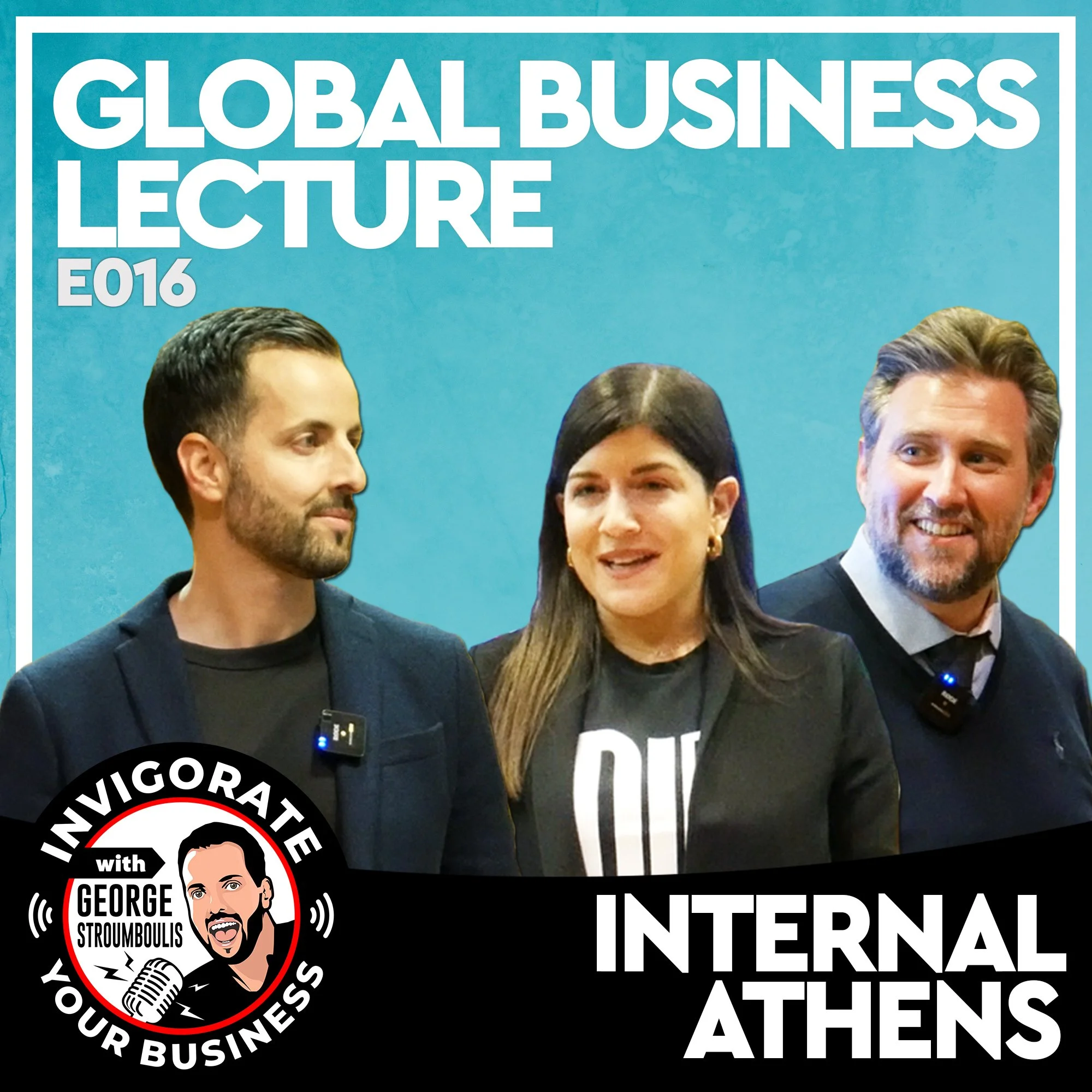
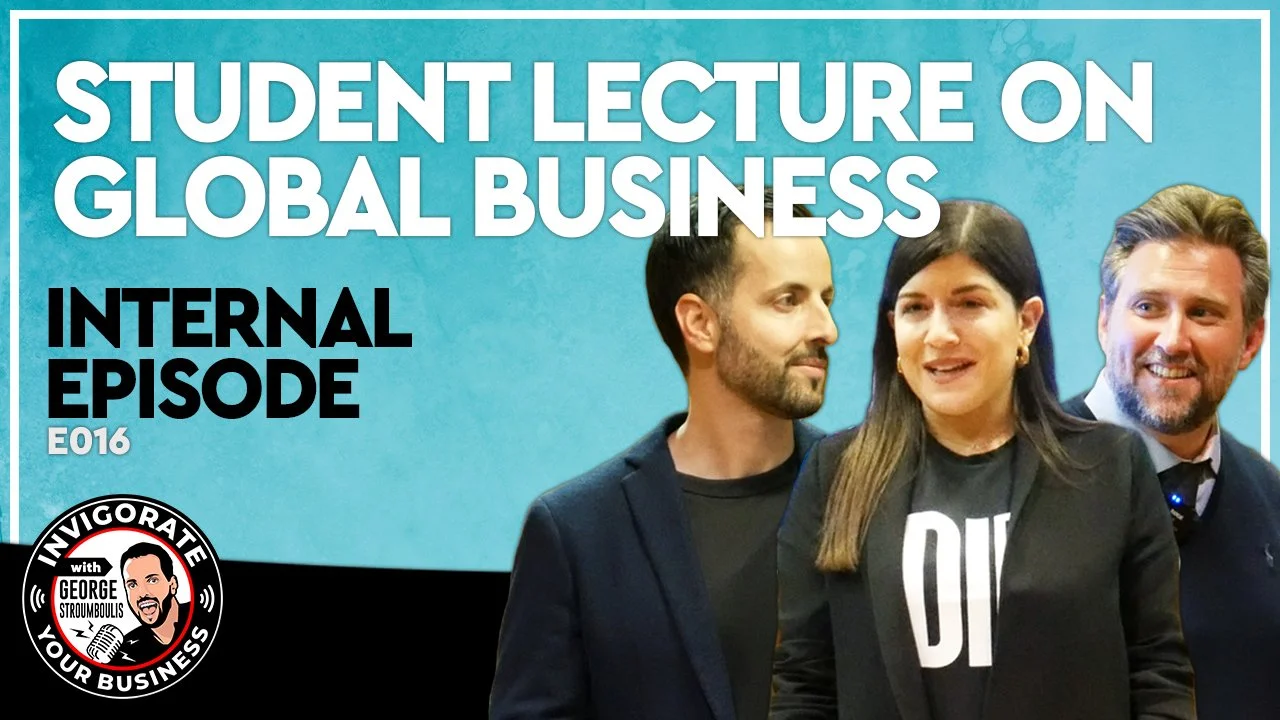
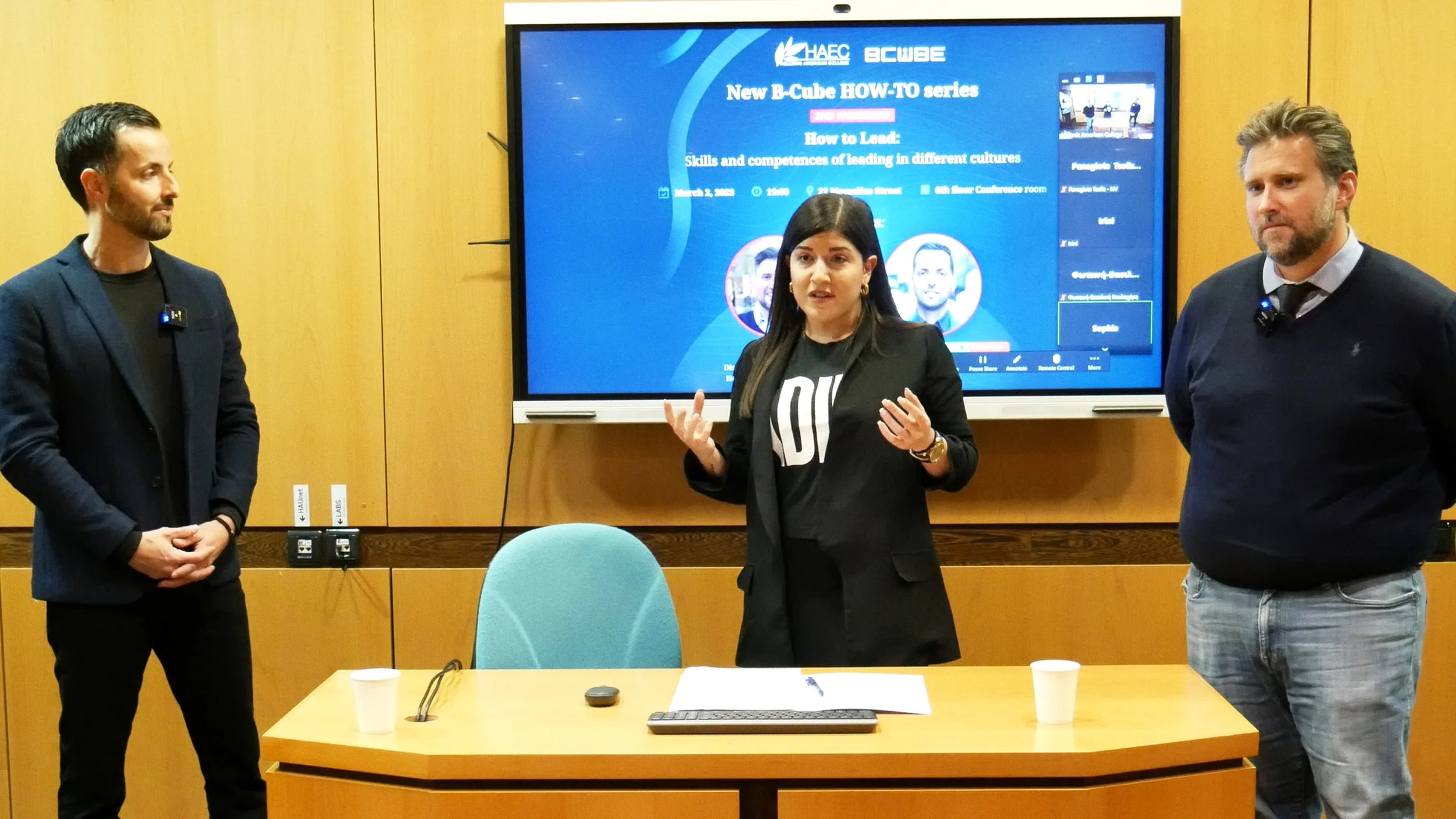
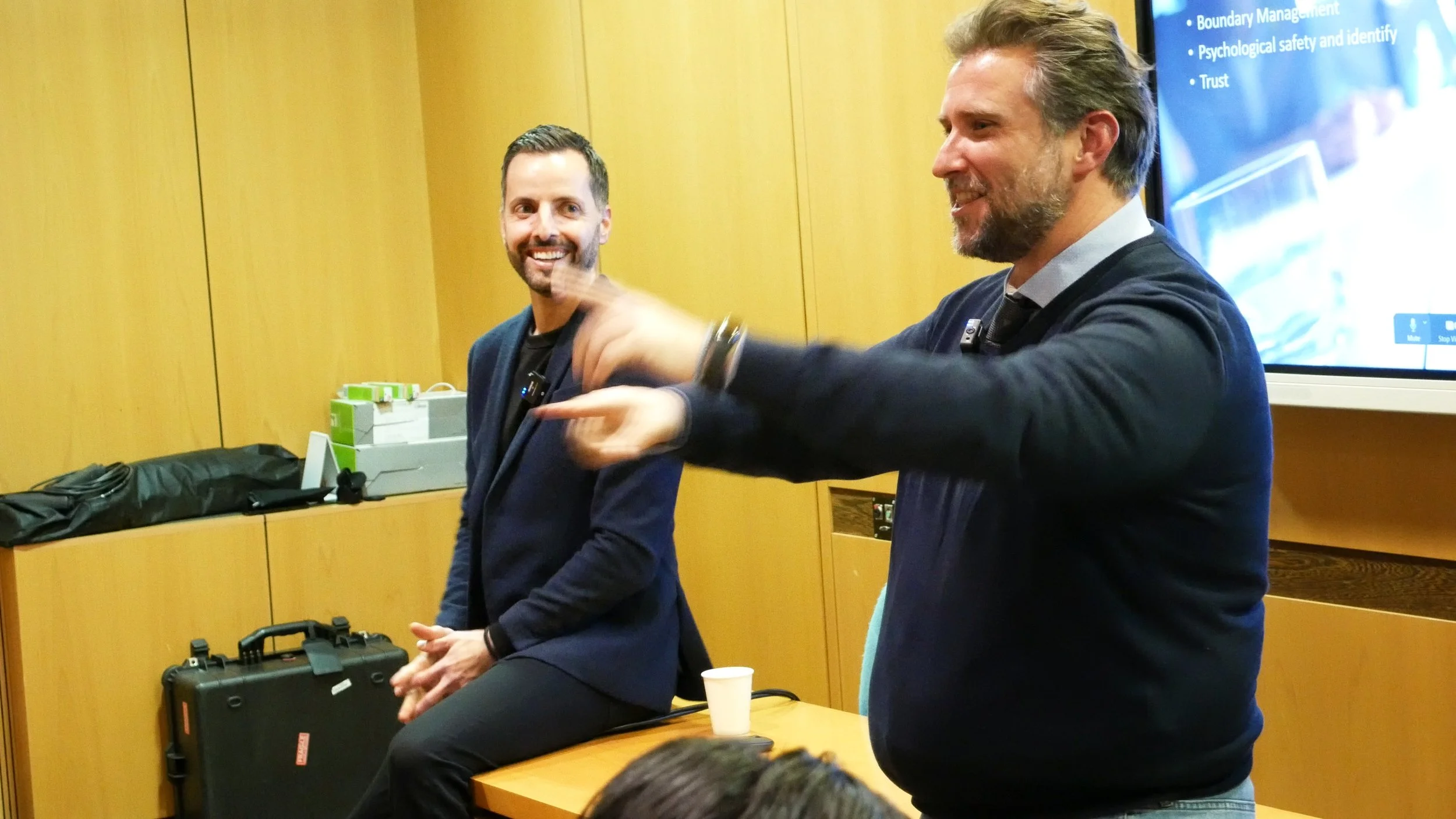
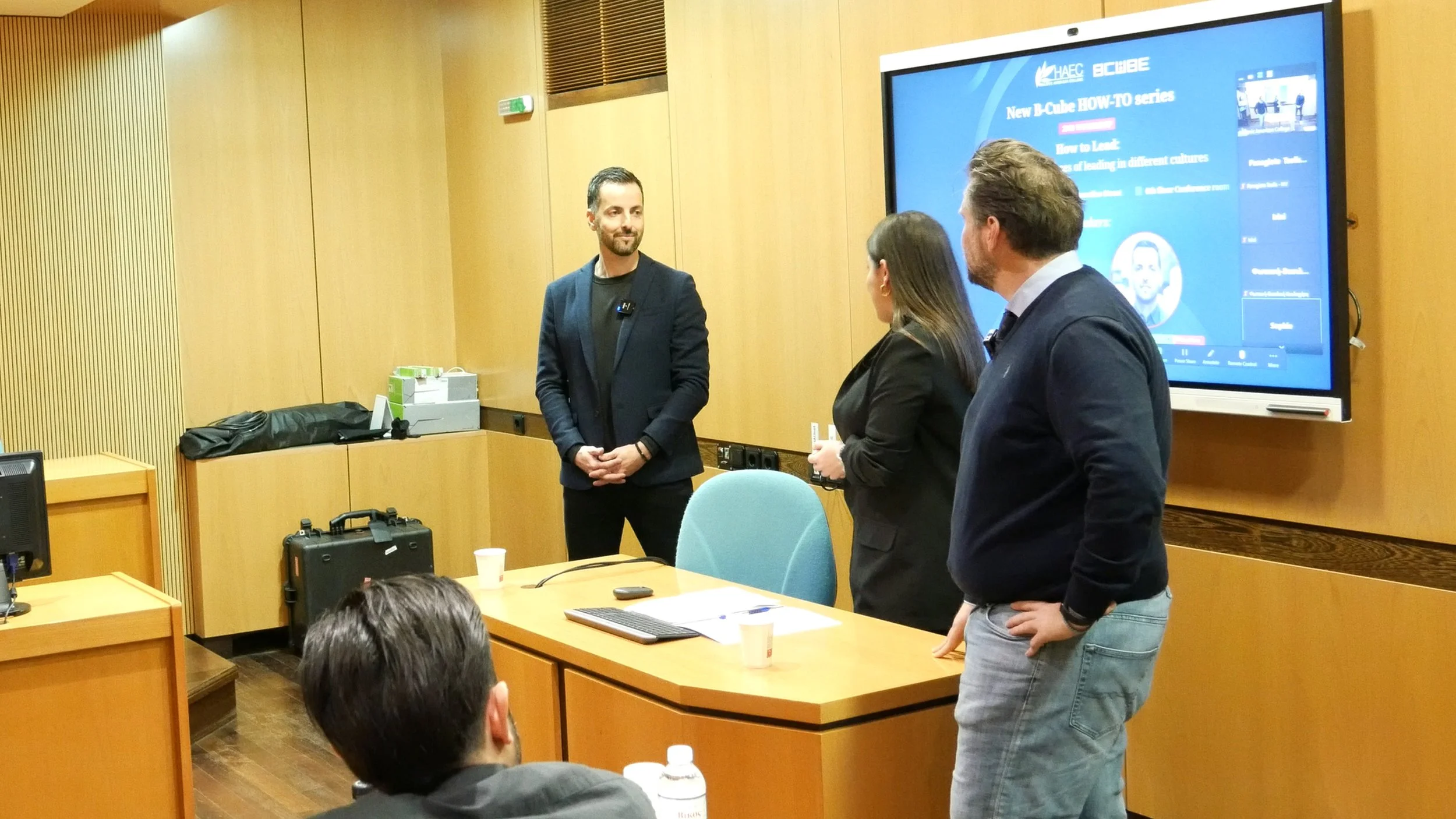
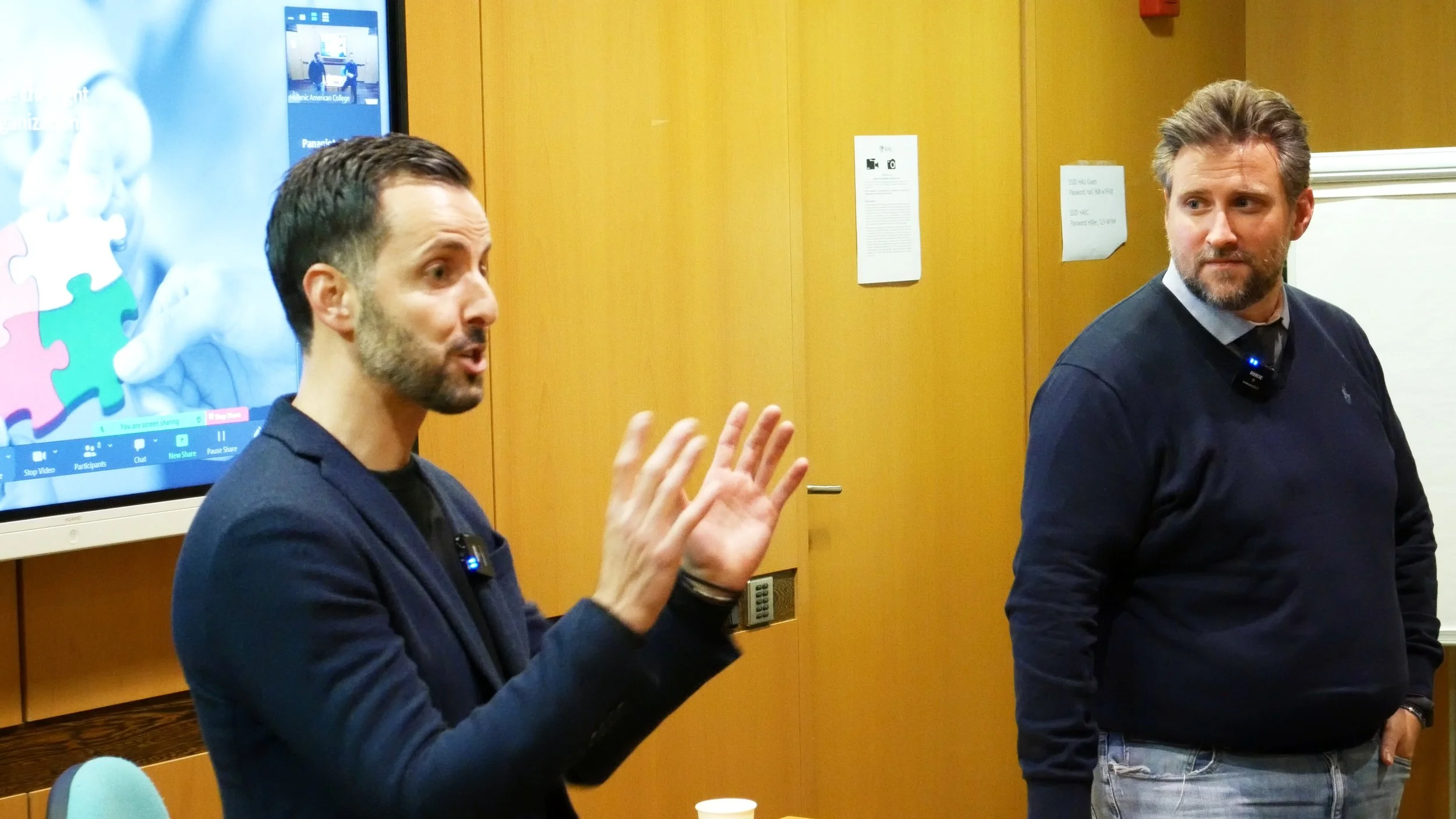

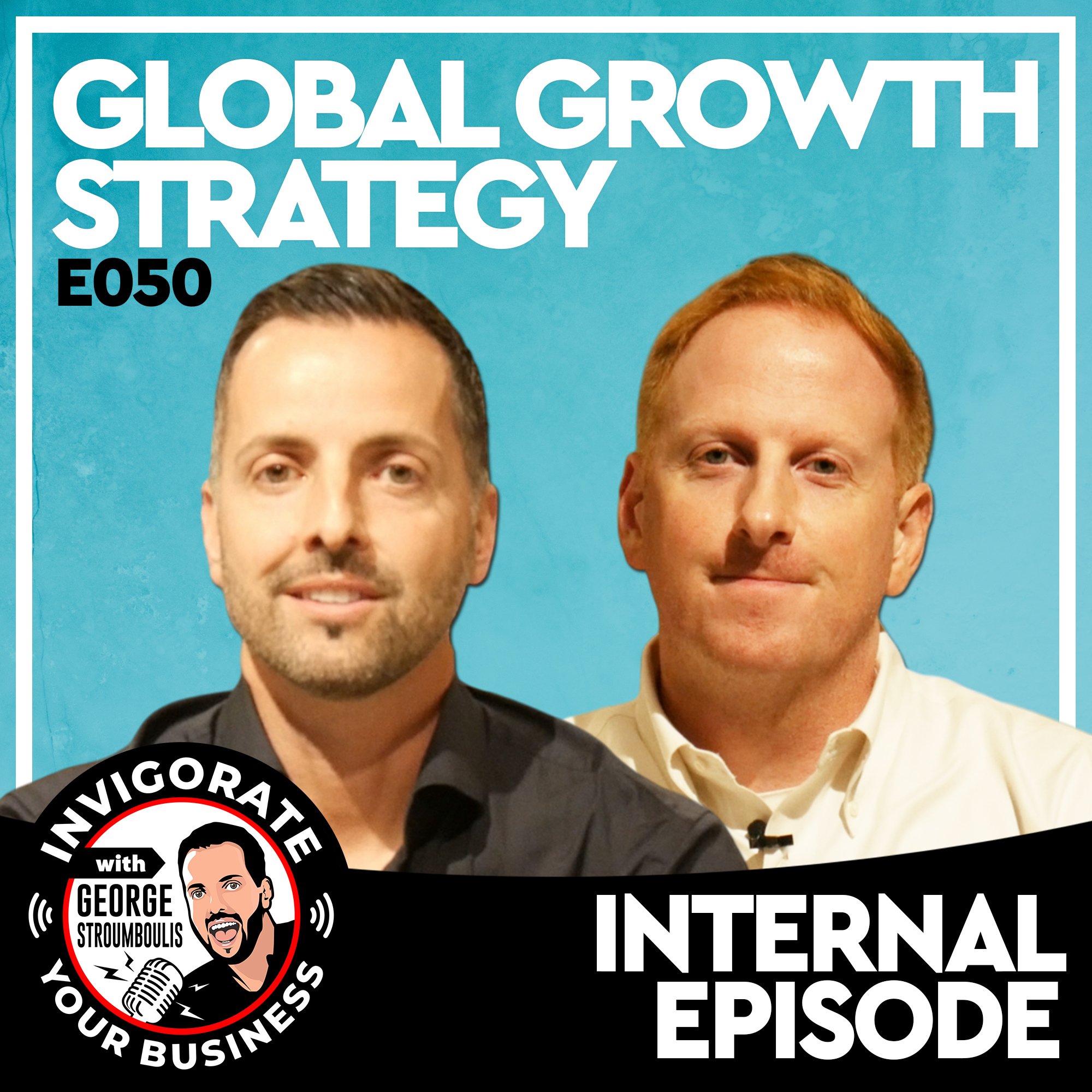





George Stroumboulis sits down with Thanasi Papoulias in Newport Beach, California on the Invigorate Your Business Podcast to talk about all things digital media, social media, influencing, online business strategies, celebrity interactions and so much more.